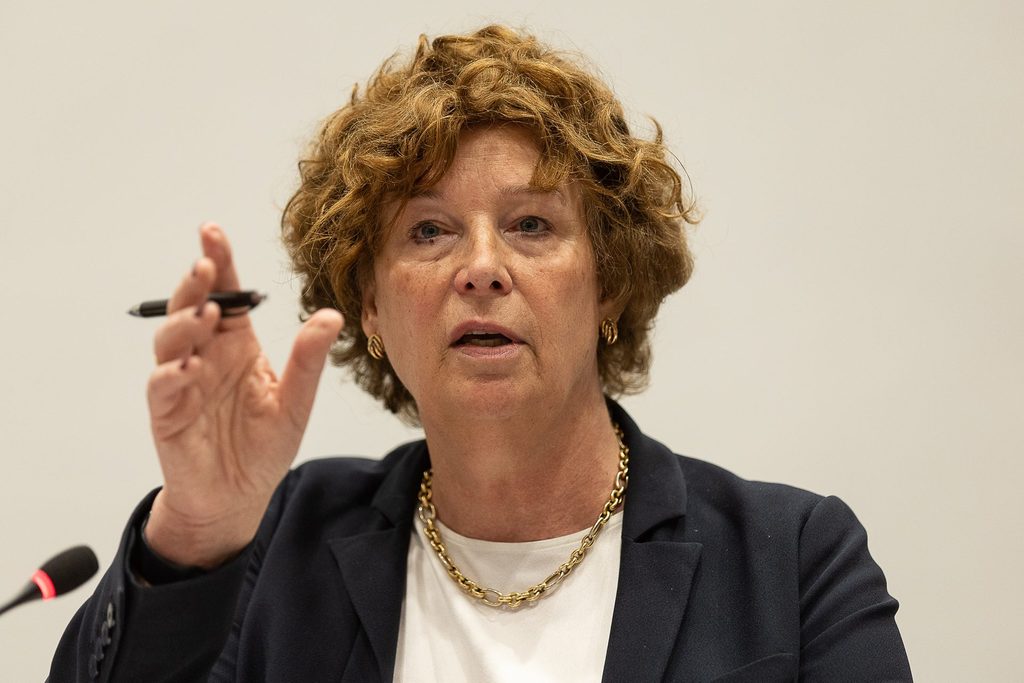Belgium's Deputy Prime Minister Petra De Sutter has urged the Federal Government to introduce sanctions against Israel as punishment for its conduct in the ongoing war in Gaza.
"It's time for sanctions against Israel," De Sutter wrote on X (formerly Twitter) on Wednesday morning. "The rain of bombs is inhumane. While war crimes are being committed in Gaza, Israel is ignoring international demands for a ceasefire. I am calling on the Federal Government to sanction Israel."
Het is tijd voor sancties tegen Israël. De bommenregen is onmenselijk.
Terwijl er oorlogsmisdaden worden gepleegd in Gaza, trekt Israël zich niets aan van de internationale eis voor een staakt-het-vuren. Binnen de federale regering roep ik mee op om Israël te sanctioneren. pic.twitter.com/Jy1TlNBjy5 — Petra De Sutter (@pdsutter) November 8, 2023
In an accompanying press release, De Sutter also called on the EU to suspend its Association Agreement with Israel and endorsed an import ban for goods produced in "illegal settlements" in the Occupied Territories.
The Minister also vehemently condemned Hamas, the armed group which controls the Gaza Strip, and demanded that it release the more than 200 hostages it seized during its bloody incursion into Israel on 7 October.
"[Hamas] is a terrorist organisation," De Sutter said. "Terrorism costs money and there must be sanctions on the companies and people who provide Hamas with money. We must also continue to reiterate that they must release the hostages."
Related News
- EU leaders draw red lines in Israel – Hamas war
- Belgian PM De Croo says situation in Gaza is ‘going too far’
De Sutter's comments come as many parties in Belgium's "Vivaldi" coalition government are reportedly warming to the idea of a boycott of Israeli goods produced in the Occupied Territories.
According to Le Soir, five of Belgium's seven coalition parties are in favour of such a boycott. These include the Flemish Christian Democrats (CD&V), the two socialist parties (Vooruit and PS), and the two environmental parties (Ecolo and De Sutter's own Flemish Greens).
Prime Minister Alexander De Croo's Flemish liberal party (Open VLD) is believed to oppose the ban, while its French-language sister party (MR) has openly criticised it.
"We don't see why we would support this measure today more than yesterday," said MR President Georges-Louis Bouchez. "This [boycott] will only aggravate the situation. We must remain calm, take a step back and not react on the spot of emotion. Especially on such sensitive topics."
Asked to comment on Petra de Sutter's call to introduce sanctions against Israel, Peter Stano, EU lead spokesperson on foreign affairs, replied at the Commission's press conference on Thursday, that EU sanctions are decided in unanimity by all 27 member states. The decision making process is conducted in confidentiality and he cannot comment on a proposal by one member of one member state.
More sanctions against Hamas are more likely. In fact, it is already sanctioned in the EU member states since it was designated a terrorist organisation by the EU in 2003. At a G7 meeting in Tokyo on Wednesday, where EU High Representative Josep Borrell participated, the foreign ministers stated that, "We are also working together, including by imposing sanctions or other measures, to deny Hamas the ability to raise and use funds to carry out atrocities".
The spokesperson confirmed that the EU "is working together to prevent further financing of Hamas from whatever sources."
EU's sanctions are exact and not extraterritorial (they apply only in the member states). To stop the financing of Hamas they would also have to target entities and individuals in non-EU countries.
Update: The article has been updated to include comments from EU's lead spokesperson on foreign affairs.

